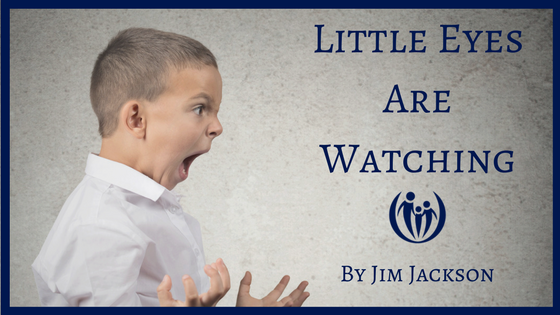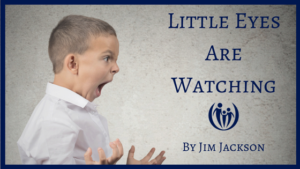
Little Eyes Are Watching

I was fixing the toilet. Two-year-old Bethany was playing in a room down the hall. I was doing final repairs needed before we closed on the sale of our house. I just needed to get my little wrench down in the tank to tighten the bolt on the new flushing chain. As I held the nut in one hand, and tightened the bolt with the wrench in the other, the whole works slipped and the wrench put a little gouge in my hand. A little angry outburst followed, accompanied by a few words I wasn’t proud of.
I carried on, and fixed the chain, and went in to Bethany. Not knowing whether she’d heard me, I simply offered, “Bethany, it’s not OK to use bad words when you’re angry is it?” She shook her head. “Well, I hope that when you get angry you don’t use bad words.” And I left it, not feeling any need to confess or talk further.
Later that day we had to bring our kids to the closing. The little ones played on the floor with toys as the grown-ups exchanged formalities and started signing all the paperwork. At one point, Bethany dropped one of her toys. What came out of her mouth next were words I wasn’t proud of – words she’d heard me say earlier that day. My example had been the teacher, not my teaching about bad words.
Talk about humble pie! Where else would she learn such vocabulary? I was busted in front of Lynne and a table full of grown-ups I’d just met. This was my early start in thinking about how to not just tell my kids to do the right things, but to be an example of the right things.
When it comes to teaching our kids about anger, the first thing we must realize is that our example is the most powerful teacher. If we expect our kids to manage their anger well, but don’t set a good example, then we are just setting a double standard that will actually make it more difficult for our children to learn.
So – set a good example. If you fall short of the standard you’d like to keep, confess it to the kids. Tell them how you wish you had behaved. Ask their forgiveness if your anger hurt them.
This will by far be your most potent way to teach your kids to handle their anger well.
Quick Tip: The way I act when I’m angry is the lesson my children learn about how to handle anger.


